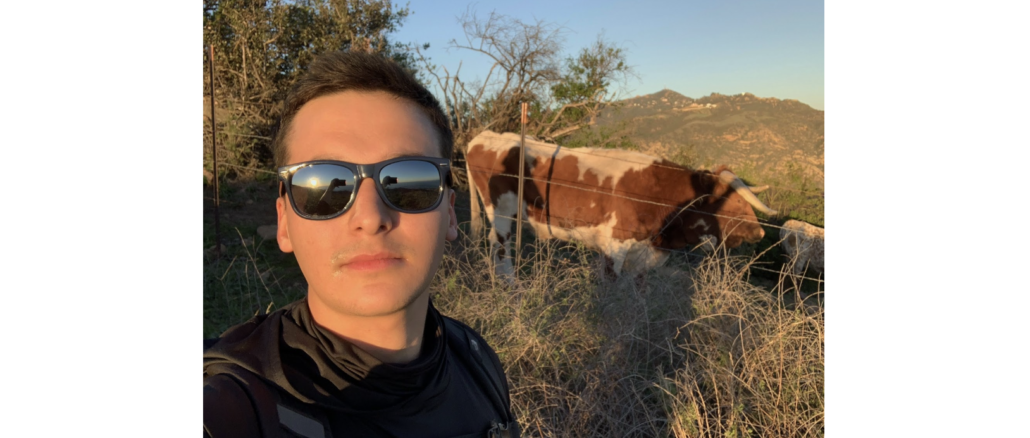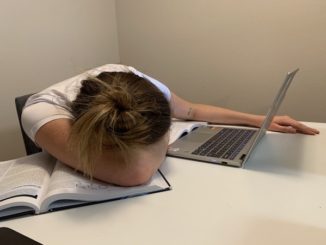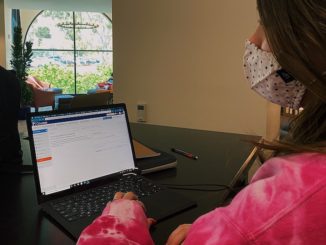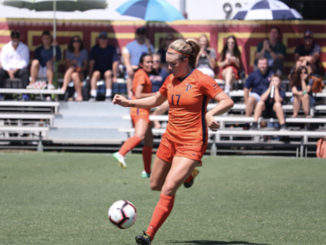
Sophomore psychology major Danny Martinez lost his best friend during his junior year of high school.
And then the COVID-19 lockdown hit.
For Martinez, that meant spending too much time in his own head, lost in his emotions. Entering the pandemic, Martinez experienced a domino effect of bad experiences, which left him emotionally stunned.
“I was just numb. I was itching to feel literally anything,” Martinez said. “I’d go through days, weeks, months where I wasn’t happy, I wasn’t sad, I wasn’t angry, I just wasn’t feeling anything.”
The Pepperdine Counseling Center has seen similar issues in countless students who have reached out, Counselor Sophia Fang said.
“The most common issues are pretty similar,” Fang said. “There’s still depression, anxiety, academic stress, relationship conflicts, grief and loss, and some traumas.”
Compounding traumas
The pandemic is an ongoing global trauma, and it is common to experience signs of distress, according to a CDC Emergency Preparedness and Response article. Common signs of distress include: Feelings of fear, anger, sadness, worry, numbness, or frustration, changes in appetite, energy, and activity levels, difficulty concentrating and making decisions, difficulty sleeping or nightmares, physical reactions, such as headaches, body pains, stomach problems, and skin rashes, worsening of chronic health problems, increased use of alcohol, tobacco or other drugs.
“For traumatic-experience, if we had to define a psychological term, it would be an event or series of events that cause a lot of psychological distress,” Fang said. “Typically marked by horror, hopelessness, and typically involves a form of serious injury, or threat and death. So basically, you may be witnessing someone else going through that or have that happen to you personally.”
For Martinez, the trauma of the pandemic was on top of the trauma of losing his friend.
“In high school, a lot of stuff happened, so I’d [have] days where I was on top of the world and days where I just wanted to die,” Martinez said.
Martinez had to deal with the loss of his best friend entering the pandemic, but said he held his feelings inside.
“I kinda just kept it to myself. It wasn’t so much that I moved on, but like I just accepted everything,” Martinez said. “I just got better at learning how to live like a person whose best friend just killed himself.”
Martinez was stuck with grief and loss. Martinez experienced a sense of hopelessness of wanting to die while witnessing all of his friends around him feeling the pain he himself also had to deal with.
Though these feelings were brought about from the loss of his best friend, Fang said COVID could be a cause for lingering feelings.
“Whenever there’s change, there’s anxiety,” Fang said. “Even though the issue we may be dealing with is depression or anxiety, there may still be some COVID-related triggers or stressors that are still lingering, such as grief or loss.”
First-time experience with unfamiliar emotions
Martinez was one of many who dealt with powerful emotions. The pandemic sent other students down a road of new experiences with negative emotions. Some for the first time, and others at a greater depth than before.
Nick Wheeler, sophomore integrated marketing communication major, felt some anxiety for his older family members when they caught the disease.
“I had both grandparents and great-grandparents that had COVID,” Wheeler said. “Fortunately they were all able to overcome it and come out healthy on the other side, but there were moments when they were dealing with that that I was fearful for their wellbeing.”
Lindsay Hall, first-year international studies major, said she faced loneliness that stemmed from the doubts in her mind.
“Even though we were all going through the same thing, it still felt like I was the one single person who was alone and who couldn’t call my friends and go see them,” Hall said.
First-year English major Carter Thomas said he felt an emotion related closely with anger.
“At first, I was definitely feeling much stronger emotions than usual, I was easily frustrated, but as time went on and as we adjusted, I was numb,” Thomas said. “Nothing really seemed to bother me anymore, which was kinda unsettling after a while.”
Being stuck in isolation left psychological marks on many of these students.
For Thomas, his social skills took a big hit.
“As time went on I found I was having to replace all of my social interaction and relationship with friends with this kind of digital facsimile for it, which started to get really depressing,” Thomas said. “I’ve forgotten how to make small talk because I had to do that very little in the last couple of years.”
Junior economics major Haven Stapleton experienced frustration due to the fear and anxiety of the public.
“The most off putting thing about this whole pandemic has been the people’s fear of meeting new people,” Stapleton said. “Their attitudes were very distant so you couldn’t really stop to talk to people at the grocery stores or anything, tellers would give you grunts checking out, so that was very frustrating.”
This made it hard for Stapleton to live his life the way he wanted due to the abnormality of the pandemic.
“I’ve tried to live as normal a life, as best I could, without endangering anyone,” Stapleton said.
Opportunity for reinvention
Many saw the lockdown as an opportunity to reinvent themselves, or even push for something they previously would not have pushed toward.
Multiple students took this time to explore and grow in their faith, namely Christianity. On the other hand, others set themselves up for their future endeavors, finding a college to call home and even determining a major.
Max Yong, a first-year international studies in global politics major, was one student who took this rare opportunity to grow in his Christian faith.
“I grew in my faith a lot,” Yong said. “Gave me a lot of time to be reflective and sit and understand where God wanted me to be and view where my heart was at the moment and where I wanted it to be.”
Hall similarly credited the quarantine for her religious growth.
“I’m a really big Christian, but I kinda lost my faith along the way during that part of my life, and over quarantine was when I started it up again,” Hall said. “So I think if I didn’t have that I would not be here right now.”
Hall saidher time in quarantine let her better set up her future. Without the quarantine she would not be attending Pepperdine, and instead thinks she would have been at a college in South Carolina.
Thomas decided to look deeper into his future with all the spare time.
“It gave me the sense of internally motivated purpose that got me to this school, led me to this major,” Thomas said.
Grieving over the past
COVID as a whole took away over a year and a half of many people’s time. Within that lost time, many have grieved over what could have been.
First-year economics major Albert Covaci grieved over high school and soccer as two experiences lost.
“It was kind of depressing actually,” Covaci said. “Because I was thinking I’m never gonna get that full ‘senior experience,’ which I guess is kind of cliche and overhyped in a way, but you know if it went either good or bad I guess it didn’t matter because I was there for it to happen, but since I wasn’t I kind of have a little bit of FOMO.”
Just like Covaci, Hall exhibited feelings of FOMO (fear of missing out) during the lockdown.
“Over the heaviest part of the quarantine it was a little tough because we were in our junior year of high school and that’s when like everyone’s best of friends and I felt like I was missing out on something,” Hall said. “Even though no one else was doing anything either, I just felt major FOMO of what could have been happening and what was supposed to happen.”
The constant need of the mind to remember the past and to think about the future is the main factor that prevents people from experiencing inner peace and personal happiness, according to Springer Open.
Covaci learned this through his experience.
“Yeah, cause I realize that, you know, life goes on, and you know if you’re just worried about the past, as much as you want to focus and think about what could’ve happened like what-ifs, it’s just a waste of time,” Covaci said. “I have to keep reminding my brain that I can’t live there anymore cause it’s over.”
Negatives turning into positives
While COVID has been difficult for many, it did provide some people with the chance to step back into society as better people.
Stapleton was perhaps the most fortunate of all.
“My life changed a lot,” Stapleton said. “I actually ended up meeting my fiance in 2020.”
For Yong and Hall, the quarantine allowed them to grow in their faith and mature as people.
Covaci gained a new self-awareness that granted him the chance to better be in the present moment.
Wheeler also now values the importance of time, and how he can capitalize in the moment.
“[The pandemic] made me realize the time we do have is extremely limited, and any amount of that time can be used to make an incredibly positive impact or do nothing at all,” Wheeler said. “And you have the rare, rare, opportunity to act in the moment. It put me in the mindset that I can capitalize on improving myself in a day-to-day situation and sort of rise through my environment to be a better person.”
The end of isolation provided Thomas with a new view on how to seize his future.
“In terms of understanding what I want to do with my life, where I want to go, it has definitely been a good thing for me and I’m really fortunate to have that experience,” Thomas said. “It actually helped me understand what my purpose is, what my calling is. I’m actually really happy to pull that out of the experience that I had.”
The lifting of the mask mandate in California also created positive feelings for students, specifically Martinez.
“I feel like it allows more freedom toward students,” Martinez said. “If people are still concerned then they can wear a mask and if they don’t mind, they just take them off. It really seems like it’s not a big deal anymore.”
Martinez was also able to look back on his troubling circumstances and realized the troubling days made him mentally stronger.
“I was more excited to be the guy that was able to push through instead of folding and having all the excuses I need,” Martinez said. “It was a blessing, I might have had bad days, but it was exactly what I needed to help me grow. I’m super thankful for that time.”
Justin Rodriguez completed the reporting for this story in Jour 241 under the supervision of Dr. Christina Littlefield and Dr. Theresa de los Santos. Dr. Littlefield supervised the web version of the story.



